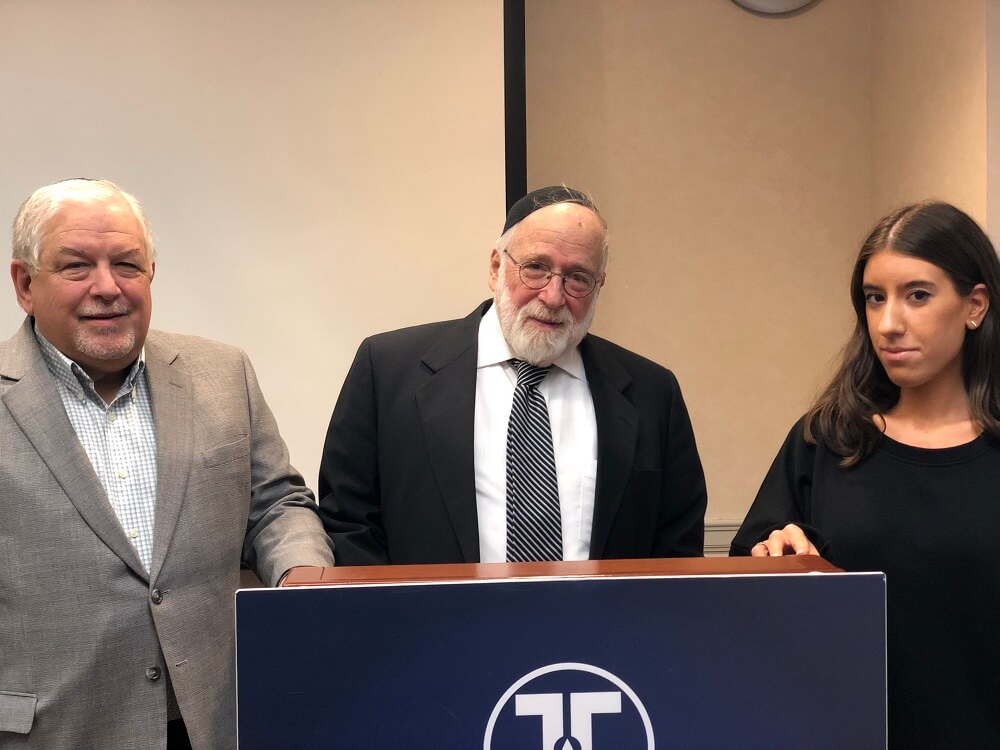When Religion Meets the Law
LAS Poli-Sci Students Learn about Religious Liberty from Leading Scholar

Close to 40 male and female students at Lander College of Arts and Sciences in Flatbush discovered how the American legal system interacts with religious liberty during a lecture by Dennis Rapps, esq., Director of the National Jewish Commission on Law and Public Affairs, on Feb. 13.
Entitled, “Religious Liberty & the Jewish Community,” and organized by LAS’s Political Science Society, Rapps spoke about the long history of religious freedom in the United States as well as his organization’s role in carving out a place for Orthodox Jews in public American life.
Raizel Deutsch, president of the political science club, said that she hoped that bringing Rapps to LAS would show students how both politics and law have a direct effect on their lives as Orthodox Jews. “A lot of times we view politics as something that doesn’t have much to do with us,” she said. “Mr. Rapps and speakers like him are able to teach us how laws and accommodations actually apply to us.”
Professor Alan Mond, deputy chair of LAS’s Political Science department and faculty advisor to the club, introduced Rapps and spoke of the current political climate. “We live in an age where religious liberty has become a major issue,” said Mond. “A great deal of work has been done balancing the interest of the general public and the interests of religious minorities. Rapps is one of the leading experts on this. Many of the legal arguments he used for the rights of Orthodox Jews have been used by lawyers for other religious minorities as well.”
Rapps began his lecture by describing the initial understanding of what religious liberty meant in America.
“In the general sense, religious liberty, especially for the Orthodox community, was the freedom from what used to occur to Jewish communities in Europe,” he explained. “Jews were forced to convert or forced to say prayers. This was prevented in the US by the parallel directive of, not only having the right to believe and worship, but having the right to act on what a person believes.”
Rapps spoke of the lawsuits his organization has been involved in, including finding a compromise between New York State autopsy laws and Jewish religious edicts. “When someone dies there’s an autopsy, but Jewish law is much more limited when allowing autopsies,” said Rapps. With the help of a posek ( a religious judge) from the Satmar Hasidic community, Rapps’ organization developed a compromise with the state, where autopsies would be performed on Jewish bodies in only a few select cases, most notably where there is fear of a spreading disease.
Rapps elaborated on accommodations workplaces are required to provide for their employees based on their religion, an extension of religious liberty laws. “My father got a job on Monday, and lost it on Friday,” recalled Rapps about the effect of his father’s Shabbos observance. Currently, there are provisions in the law against the religious discrimination that his father faced with companies, both public and private, required to provide reasonable accommodation for an employee’s sincerely held religious belief, if the accommodation will not impose more than a de minimis cost or burden. Rapps said that the current understanding of what constitutes a de minimis cost might be challenged in an upcoming case to the Supreme Court.
For his last topic, Rapps spoke of the latest iteration of religious liberty, when a protected class like religion, conflicts with another protected class, like gender or sexuality, as occurred when the Supreme Court heard the Masterpiece Cakeshop case last year.
“There is a conflict between two protected classes— Which class takes priority?“ Rapps asked audience members, many of whom offered their own opinions. (Rapps noted that the question was sidestepped in the court’s ruling which focused on the baker’s freedom of expression.)
During the lecture, Rapps engaged in a lively discussion with attendees who offered their opinions about the repercussions and rationale for various laws. “Why is it moral for the government to tell me who I can do business with?” Asked one student from a political science class. “I’m not a moralist,” responded Rapps. “I’m a lawyer. Why is hitting someone a crime? Because the law says it is. Why is discrimination a crime? Because the law says it is.”
Rapps praised the students at the end. “They were a great audience,” he said, adding that he teaches the same material in law school classes and the questions he received tonight were of the same caliber.
“It opened my eyes,” said LAS student Chanania Yousaflaleh. “I’m going to try to gain a deeper understanding of how our religion interacts with law.”
Yisroel Appelbaum, a pre-med student on an accelerated track in LAS, attended the lecture with his classmates from a political science class. “I found it interesting that religious liberty laws extend to me even when I will be in medical school,” he said. “This means my Shabbos observance won’t be affected by medical school.”

